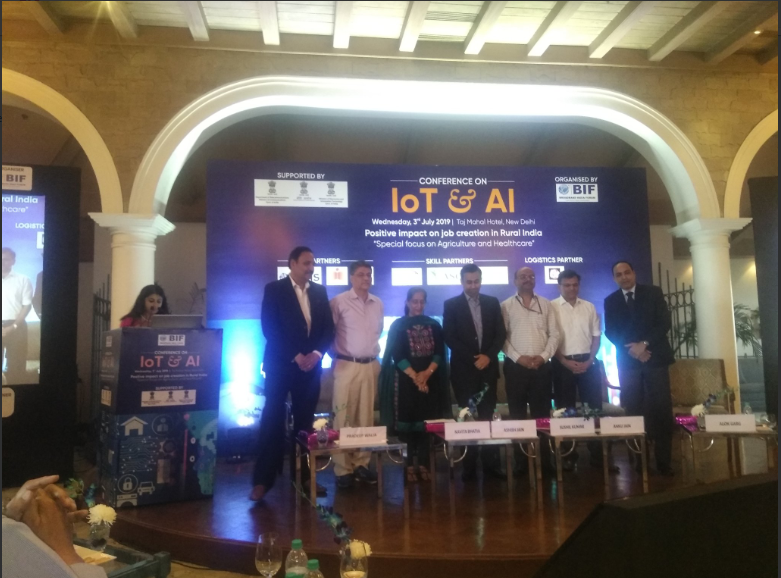Inside BENEO’s new pulse plant: pioneering sustainable protein from faba beans
Study supported by Electronics Skill Council of India & Agriculture Skill Council of India
Broadband India Forum (BIF), a think tank for Digital Transformation held a seminar on ‘The Impact of IoT on Jobs in Rural India’ to highlight the positive impact of Artificial Intelligence (AI) and Internet of Things (IoT) on job creation in the agriculture sectors in India.
As part of the seminar, BIF also released the findings of an on-going study that has being done in consultation with the Electronics Skill Council of India, Agriculture Skill Council of India.
The study highlights that IoT and AI based applications can have a transformational impact with regards to rural job creation and at a conservative estimate, will create over 2.8 million jobs in rural India over a period of 8-10 years with an annual value of Rs. 60,000 crores (approx. US$ 8.9 billion).
Of this, at least 2.1 million jobs will be created for the agriculture sector. These jobs will be created over next 8 – 10 years and the pace and quantity of job creation is likely to further increase post 2021-22 once 5G technology is implemented. The Electronics Skill Council of India, Agriculture Skill Council of India have also supported BIF in this seminar and a formal report on the study is expected to be released shortly.
In his inaugural address, Yaduvendra Mathur, Special Secretary, NITI Aayog said, “There is no denying the role that avant-garde technologies such as IoT and AI can play in the agriculture and healthcare sectors – especially in rural areas. India is the Saudi Arabia for generation of data. It is important to realize that India has the hardware, we have the data scientists, we have the algorithms – what we don’t have is real-time, clearly labelled and relevant data from the field. From a Niti Aayog perspective, our focus is on data and that we get access to real-time data that can impact the creation of policy. We are therefore looking at a huge volume of real-time data being harvested from both the healthcare and agriculture domains and shared with us. A lot of work using AI is currently already underway by the government in the healthcare domain – for example the programme for the elimination of Tuberculosis is using AI to improve TB diagnosis. From an agriculture perspective, AI and IoT are important because the diversification of Indian agriculture will not happen unless the farmer trusts the data that is shared with him. This will also require the participation of the private sector, specifically start-ups in the collation of labelling of this data, which in itself will create a huge number of jobs at the data-labelling level.”
Dr. Saikrishna Nanduri, CEO, National Skills Sector Council in his address said, “Indian agriculture employs 50% of manpower and we’ve been seeing declining levels of employment as people leave the sector for better opportunities. The net contribution to the GDP also remains low. IoT and AI can make a huge contribution to transforming Indian agriculture, specifically with regards to productivity enhancement. What is a huge enabler to this is also the high levels of digital literacy in India and our demographic dividend that makes us the world’s youngest country. We need to begin by data collection and aggregation – much of it through start-ups. This data will need to be collated and labelled by large Big Data companies and public sector organisations. Once this is done it can be integrated into the user interface and then used by communities, organisations and individuals who will gladly even pay for this.”
TV Ramachandran, President Broadband India Forum further added, “It is no secret that the impact of AI and IoT will be truly transformational across industry. The BIF report, for the very first time, shares very significant findings in relation to the impact of IoT on job creation in rural India, specific to agriculture and healthcare. Given India’s young demographic profile, sustained job creation is the most critical aspect to keep the wheels of the economy running. Rural India, with 50% of the country’s workforce needs to ensure that it garners a significant share of this. “
Some of the highlights of the ongoing study were presented by Devendranath, COO, Feedback Consulting which is conducting this research jointly along with BIF, about the principal challenges affecting the Indian agriculture sector, where land holdings are getting smaller and farm incomes are declining. The percentage of employment in Indian agriculture sector has consistently reduced from 52% in 2010 to 42% in 2018. The potential of IoT based applications in reversing this trend represents a huge positive impact. The study highlights that key applications such as Satellite Mapping, Electronic Market Place, Livestock Traceability, Climate Sensing Stations, Product Traceability, and Agriculture Drones have the potential to transform the ailing sector. These applications will help create smart farms and will bring lot more predictability in agriculture output which in turn will help improve incomes and lives of farmers.
The release of the findings was followed by three panel discussions that centered around: (i) National strategy for AI & IoT in Agriculture & Healthcare; (ii) Impact of AI and IoT on Agriculture.

